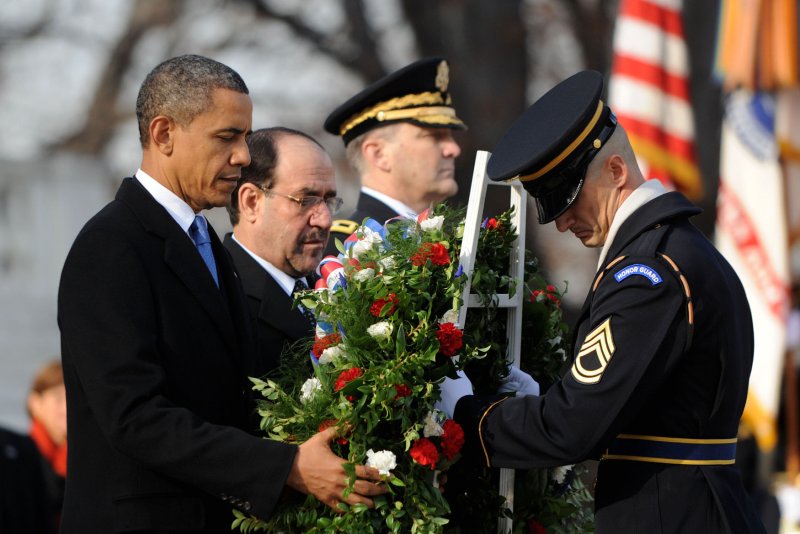1 of 2 | President Barack Obama participates with Prime Minister Nouri al-Maliki of Iraq participate in a wreath laying ceremony at Arlington National Cemetery on December 12, 2011 in Arlington, Virginia. UPI/Olivier Douliery/Pool |
License Photo
WASHINGTON, Dec. 12 (UPI) -- U.S. President Barack Obama and Iraqi Prime Minister Nouri al-Maliki pledged Monday the two countries' will have a strong relationship going forward.
Obama and Maliki met in the Oval Office, and in front of reporters later, the U.S. president lauded Iraqis' work to build a democracy and assume responsibility for their own defense after the United States' nearly nine-year war there following the toppling of dictator Saddam Hussein.
"Mr. Prime Minister, as we end this war and as Iraq faces its future, the Iraqi people must know that you will not stand alone. You have a strong and enduring partner in the United States of America," Obama said.
"And so today the prime minister and I are reaffirming our common vision of a long-term partnership between our nations. This is in keeping with our strategic framework agreement, and it will be like the close relationships we have with other sovereign nations."
Maliki, speaking through a translator, said the withdrawal of U.S. forces from his country at the end of the month "indicates success, not like others have said, that it was negative."
"Iraq had a political process established, a democratic process, and adoption of the principles of elections and the peaceful transfer of authority," Maliki said. "Iraq is following a foreign policy in which it does not interfere in the affairs of others and does not allow the others to intervene in its own affairs."
While underlining his nation's independence, he said, Iraq still needs U.S. cooperation in combating terrorism, training its forces and other security issues.
Maliki said the two leaders discussed details "that would put the framework agreement into implementation, and here we talked about it and its activation." He said a joint committee from the two countries will meet regularly to work out how to implement agreements between them.
"And we feel that we need political cooperation as well, in addition to cooperating on the security and economic and commercial fields," Maliki said.
"Iraq wants to rebuild all the sectors that were harmed because of the war and because of the adventurous policies that were used by the former regime, and we need a wide range of reform in the area of education. We have succeeded in signing several agreements, through the educational initiative, which put hundreds of our college graduates to continue their graduate studies and specialized subject in American universities."
Obama said the relationship "will evolve over time."
"Our goal is simply to make sure that Iraq succeeds because we think a successful democratic Iraq can be a model for the entire region," he said.
While, U.S. troops are leaving Iraq, there will still be a strong diplomatic presence, and "military-to-military ties that are no different from the ties that we have with countries throughout the region and around the world."
"You know, we both have interests in making sure that the sea lanes remain open in and around Iraq and throughout the region. And so there may be occasion for joint exercises," Obama said.
"We both have interests in counterterrorism operations that might undermine Iraqi sovereignty, but also could affect U.S. interests. And we'll be working together on those issues."
Obama ran for office in 2008 promising to wind down the war in Iraq and polls indicate majorities of Americans and Iraqis support that goal.
The war cost the lives of 4,400 U.S. troops and more than $1 trillion from the U.S. treasury.
About 150 Defense Department military and civilian personnel are to remain in Iraq to guard the U.S. Embassy, among other responsibilities. They will operate under the State Department, which will take the leading role in Iraq.
The U.S. ended official combat operations in August 2010. Maliki indicated in November he was open to an eventual return of U.S. troops as trainers.
Even as the military reduces its troop strength, the CIA will continue to have a major presence in the country, as will State Department security contractors, officials said.















